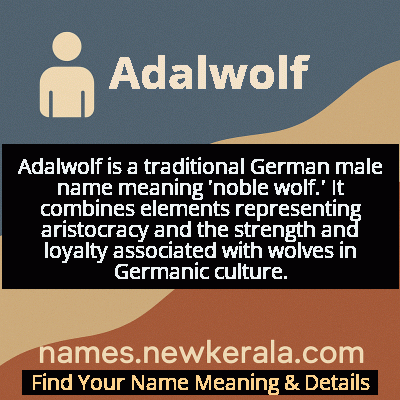Adalwolf Name Meaning & Details
Origin, Popularity, Numerology Analysis & Name Meaning of Adalwolf
Discover the origin, meaning, and cultural significance of the name ADALWOLF. Delve into its historical roots and explore the lasting impact it has had on communities and traditions.
Name
Adalwolf
Gender
Male
Origin
German
Lucky Number
2
Meaning of the Name - Adalwolf
Adalwolf is a traditional German male name meaning 'noble wolf.' It combines elements representing aristocracy and the strength and loyalty associated with wolves in Germanic culture.
Adalwolf - Complete Numerology Analysis
Your Numerology Number
Based on Pythagorean Numerology System
Ruling Planet
Moon
Positive Nature
Diplomatic, friendly, artistic, empathetic.
Negative Traits
Over-sensitive, moody, indecisive, prone to self-pity.
Lucky Colours
Green, cream, white.
Lucky Days
Monday.
Lucky Stones
Pearl, moonstone.
Harmony Numbers
1, 3, 4.
Best Suited Professions
Diplomats, mediators, caregivers, artists.
What People Like About You
Cooperative spirit, friendliness, artistic talent.
Famous People Named Adalwolf
Adalwolf of Einsiedeln
Benedictine monk and abbot
Served as abbot of Einsiedeln Abbey in Switzerland, contributing to medieval monastic scholarship
Adalwolf of Tegernsee
Benedictine monk and scribe
Illuminated manuscript artist and calligrapher at Tegernsee Abbey in Bavaria
Adalwolf von St. Gallen
Monastic scholar
Contributed to the intellectual life at St. Gallen Abbey during the Carolingian Renaissance
Name Variations & International Equivalents
Click on blue names to explore their detailed meanings. Gray names with will be available soon.
Cultural & Historical Significance
The name's cultural significance extends to Germanic mythology, where wolves were sacred to Odin and represented both destructive and protective forces. In medieval Germanic society, the name Adalwolf would have conveyed expectations of leadership, bravery, and aristocratic responsibility. The name's usage declined significantly after World War II due to associations with Adolf Hitler, though it maintains historical importance in studies of medieval Germanic onomastics and represents an important piece of cultural heritage from the early Germanic period.
Extended Personality Analysis
Individuals named Adalwolf are typically perceived as possessing strong leadership qualities, combining the nobility and dignity suggested by the 'adal' element with the fierce loyalty and protective instincts associated with wolves. They often demonstrate strategic thinking, courage in adversity, and a deep sense of responsibility toward their community or family. The wolf symbolism suggests someone who values pack mentality - fiercely loyal to their inner circle while maintaining independence and strength.
These individuals often balance aristocratic refinement with primal intuition, making them both respected leaders and formidable protectors who command respect through both their character and capabilities. The combination of noble bearing and wolf-like attributes creates a personality that is both dignified and powerful, capable of great loyalty to those they consider part of their 'pack' while maintaining the strategic distance necessary for effective leadership. They tend to be perceptive, with strong instincts about people and situations, and often serve as natural protectors and guides for their communities.
Modern Usage & Popularity
In contemporary times, Adalwolf is extremely rare as a given name, primarily used in historical contexts or by families with strong Germanic heritage seeking to revive traditional names. The name's usage declined dramatically in the 20th century and remains uncommon due to phonetic similarity to Adolf, which carries heavy historical baggage. However, it occasionally appears in historical fiction, fantasy literature, and among name enthusiasts interested in reviving ancient Germanic names. In Germany and Austria, the name is virtually nonexistent in birth records since 1945, though it maintains some presence in genealogical research and historical studies. Recent years have seen minor interest in the name among historical reenactment communities and those studying medieval Germanic culture, but it remains a niche choice rather than a popular modern name.
Symbolic & Spiritual Meanings
Symbolically, Adalwolf represents the union of civilization and wild nature - the noble (adal) representing order, aristocracy, and refined society, while the wolf symbolizes primal strength, instinct, and freedom. This combination creates a powerful metaphor for balanced leadership that respects tradition while maintaining connection to fundamental human instincts. The wolf in Germanic symbolism also represents guidance (as in the wolf that led Germanic tribes), protection of family, and spiritual strength. The name thus embodies the ideal of a leader who bridges the civilized and natural worlds, possessing both the refinement of nobility and the untamed spirit of the wilderness. This symbolic duality speaks to the human aspiration to integrate social sophistication with authentic, instinctual wisdom.

